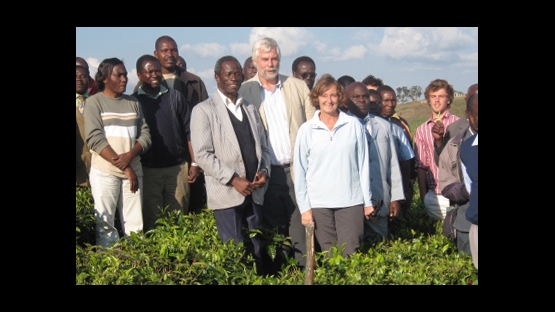Tea is Tanzania's fifth largest export crop, and the livelihood of many small scale farmers depends on it. Currently, most tea production in the country, especially small scale production, depends fully on rainfall. However, Tanzania, like many other African countries, suffers from land degradation and is vulnerable to climatic variability and frequent droughts. An IAEA technical cooperation project, 'Enhancing the Productivity of High Value Crops and Income Generation with Small Scale Irrigation Technologies' (RAF/5/058), is being carried out in cooperation with the Tea Research Institute of Tanzania (TRIT), at the Igoda Model Team Farm. This regional project involving 19 African countries aims to develop and pilot test appropriate irrigation systems, with the goal of enabling small scale farmers to increase the yield and quality of high value crops. Using isotopic and nuclear techniques, the project will increase resource use efficiency, contributing to enhanced food security, improvements in farmer livelihoods and environmental sustainability. The project also contributes to climate change mitigation and adaptation.
Under the project, water is applied straight to the roots of the plant via drip irrigation, targeting it to where and when crops need it most. It enhances water use efficiency - i.e. "more crop per drop" - while minimizing unnecessary losses through soil evaporation. The studies carried out so far showed that drip irrigation increases yield while saves irrigation water by up to 30% compared to sprinkler irrigation. The project has generated tremendous interest from smallholder farmers who are eager to adopt the technology. A Farmers Field Day to further create awareness and enhance technology transfer to local smallholder tea growers/farmers will be held this month.
The Igoda Model Tea Farm was visited this July by the Honourable Tim Clarke, UK High Commissioner and Ambassador of the European Commission to the United Republic of Tanzania. Ambassador Clarke was launching a tree planting campaign at the tea farm to offset greenhouse gas (GHG) emissions from Umoja House building in Dar es Salaam and enhance resource use efficiency (RUE). Resource use efficiency includes management practices that enhance the efficient use and conservation of topsoil, fertilizers, irrigation and rainwater. The latter is an important aspect of the Agency's work on sustainable soil and water management, whereby isotopic and nuclear techniques are used to quantify the resource use efficiency and movement of water and nutrients in farm lands; to track sources and sinks of GHG in agriculture and to assess the extent of GHG emissions and soil carbon sequestration, which is the capture of atmospheric carbon dioxide into plants and eventually into soils.
During their visit to Igoda Model Tea Farm, Ambassador Clarke and his wife were briefed by the TRIT Executive Director, Prof Bruno John Ndunguru, on the development and achievements of the irrigation project.



